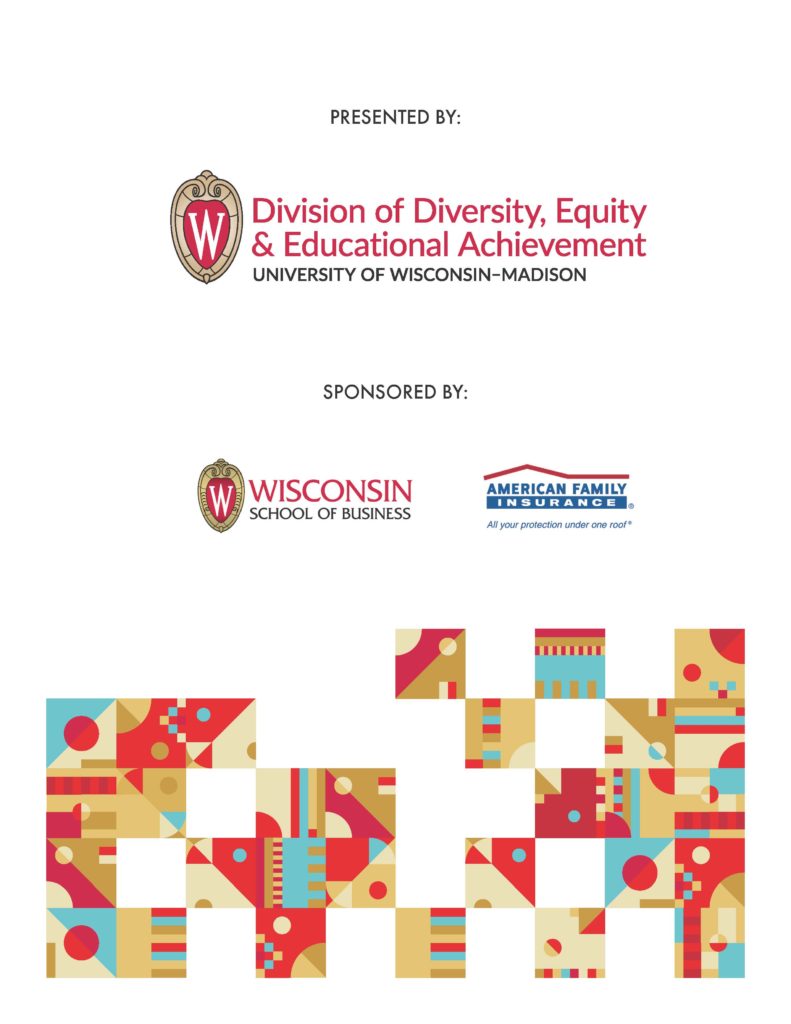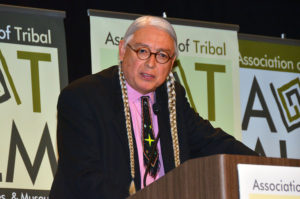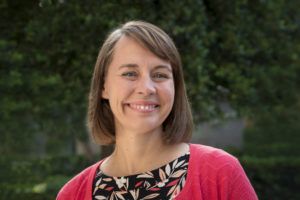 2017 Diversity Forum
2017 Diversity Forum
Together: Building Cultural Capacity
Day One Agenda, November 7
8:00-8:30 a.m. Registration and Breakfast
8:30 a.m. Opening Ceremonies
Welcome by UW-Madison Provost Sarah Mangelsdorf
Forum Overview by Patrick J. Sims, Vice Provost & Chief Diversity Office
Native November Acknowledgement by the Ho-Chunk Nation Bear Clan Singers, led by Mr. Gerald Cleveland
9 a.m. Keynote Speaker Attorney Walter Echo-Hawk
“The Dawn of Human Rights in the Era of Federal Indian Law”
10:15 -10:30 a.m. Break: Book signing with Walter Echo-Hawk

Walter Echo-Hawk is a Native American attorney, tribal judge, author, activist, and law professor. Echo-Hawk represents Indian tribes on important legal issues such as treaty rights, water rights, religious freedom, prisoner rights, and repatriation rights. His career spans the pivotal years when Indian tribes reclaimed their land, sovereignty, and pride in a stride toward freedom.
As a Native American rights attorney since 1973, Echo-Hawk worked at the epicenter of a great social movement alongside visionary tribal leaders, visited tribes in indigenous habitats throughout North America, and was instrumental in the passage of landmark laws, including the Native American Graves Protection and Repatriation Act (1990) and the American Indian Religious Freedom Act Amendments (1994).
He litigated in many epic struggles and has written extensively about the rise of modern Indian nations as a Native American author with first-hand experience, such as his groundbreaking book, In the Courts of the Conqueror: The 10 Worst Indian Law Cases Ever Decided (2010). Echo-Hawk will host a book signing following his remarks.
10:30 a.m. – Noon Breakout Session I
Supporting American Muslim Students in 2017
Landmark Room, third floor
Panelists: Maria Ahmad, Assistant Director of Leadership and Involvement, Multicultural Student Center, and Student Panelists
Being a Muslim college student in 2017 is an identity that is deeply personal but also one that ends up as a common public debate; and the student develops from the impact of both. The session will equip professionals with tools, tips, and insight on how to best support Muslim students’ identity development and build authentic relationships, while empowering students to stand up to bigotry, microaggressions, and hate in a proactive manner.
Words Matter: Developing Meaningful Conversations Around Microaggressions
Varsity Hall 2, second floor
Panelists: Martina Diaz, Senior Advisor, Office of Student Financial Aid, Division of Enrollment Management; Paula Gates, Human Resources Assistant, Office of the Vice Provost, Division of Enrollment Management; Darren M. Martin
Student Services Coordinator/Financial Aid Advisor, Office of Student Financial Aid, Associate Lecturer, Wisconsin Experience Seminar; Caitlin Yunis, Co-Facilitator, Learning Communities for Institutional Change and Excellence; Division of Enrollment Management, Dale Redmond, IS System Development Services Specialist, Office of the Registrar, Division of Enrollment Management; Lori Christianson, Admissions Counselor, Office of Admissions and Recruitment, Division of Enrollment Management.
Join co-facilitator/participants for the Division of Enrollment Management Engagement, Inclusion and Diversity (EID) Committee. They are “participatory practitioners” and not experts, who have co-created and implemented sessions on microaggressions within the Divisional learning communities and learning journeys over the past three years. Over 90% of the participants who attended this workshop last spring said they feel more comfortable having conversations about microaggressions after attending this session. Over 85% said they thought they were more likely to address a microaggression if they witnessed one after having participated in this workshop. This is an introductory-level session that defines microaggressions, provides examples, and discusses ways to address them. This session provides a framework that can be used to facilitate discussions on microaggressions.
Tokenism in Disguise: Reclaiming Individualism
Industry Room, third floor
Panelist: Sheridan Blanford, UW Athletics Department, Diversity & Inclusion; Christopher Kilgour, Outreach Specialist, Information Technology Academy, Division of Information Technology; Caitlyn LoMonte, Associate Student Services Coordinator, Division of Student Life, Multicultural Student Center.
This roundtable discussion seeks to arrive at best practices for interrupting tokenism, or putting the onus on people who present as a particular identity to represent the viewpoints of an entire group. We know this happens to students in classrooms, as well as throughout our work and social lives. What are ways that we can all disrupt and avoid the tendency to ask members of a historically underrepresented minority group to speak on behalf of their entire population? And how can individuals who hold a particular ideology bring their whole selves to the table, without the assumption that they are speaking on behalf of an entire identity. We don’t know the answers, but we seek to find a new path forward; both for individuals who perpetuate this behavior, as well as those who may be victimized by these types of questions.
Start from Within Meditation Workshop
Agriculture Room, third floor
Led by Esty Dinur, Wisconsin Union Theater Community Relations and Publicity Director, Meditation Guide
How to change the world without adding negativity, conflict and divisiveness? How to find internal peace and be grounded so that you can be most effective amidst the literal and symbolic storms that fashion our lives currently? How to avoid Othering and the assignment of enemies? How can we transcend the pain and confusion of our own personal circumstances so our work is more successful? This workshop we will provide helpful tools. Dress comfortably. We will have chairs. If you like, bring a meditation cushion or anything else that would make you comfortable.
Campus Climate Survey Task Force Report
12:15 p.m. – 1:30 p.m. Lunch and Learn
Room: Varsity Hall 2 & 3
Panelists: Patrick Sims, Vice Provost for Diversity & Climate and Chief Diversity Officer and Lori Berquam, Vice Provost for Student Life and Dean of Students; Margaret Harrigan, Distinguished Policy and Planning Analyst, Office of Academic Planning and Institutional Research.
Last fall, we began a project that is important to the future of UW-Madison: A study of our campus climate, with findings informed by our first-ever campus-wide survey of students. More than 8,000 students participated in the survey, which found that while most students view the climate positively, that’s not true for everyone. Students from historically underrepresented and disadvantaged groups report experiencing a less favorable campus climate than majority students. Since April the Campus Climate Survey Task Force has analyzed survey findings and recommended goals and next steps. We’re here to report back on what we’ve learned, share how we plan to improve, and ask that you join us in charting that future path.
1:45 p.m. – 3:15 p.m. Breakout Session II
Food for Thought: A Look into Food Insecurity in Dane County
The Marquee, second floor
Panelists: Kim Gromek, Internal Director, Open Seat Food Pantry; Charles McLimans, Executive Director, River Food Pantry
We will develop ways in which the community can help with this issue. The Open Seat Food Pantry and The River Food Pantry partner to address and discuss the topic of food insecurity within Dane county, specifically within college students and the general community. We will define food insecurity, discuss the prevalence of food insecurity, and finally, develop methods to help with this issue.
Forward in Access: Creating Inclusive Environments for Students with Disabilities
Northwoods Room, third floor
Panelists: Kate Link, Accommodation Specialist, McBurney Disability Resource Center; Mike Mohr, Accommodation Specialist, McBurney Disability Resource Center; Mari Magler, Director, McBurney Disability Resource Center.
Using a universal design (UD) framework, we will discuss privilege as it relates to ability and ways we can create more inclusive spaces at UW Madison. Utilizing a comprehensive model for conceptualizing an individual’s experience with disability, we will explore the impacts of disability and ways to move forward in access.
Our Wisconsin: Creating Campus Culture from Day One
Industry Room, third floor
Panelists: Aaric Guerriero, Director of Inclusion Education; Tristen Johnson, Program Coordinator, Our Wisconsin; Student Panelists
Our Wisconsin launched in 2017, introducing first year residential students to conversations around inclusivity and diversity. Come join us to learn more about our curriculum, hear what students are saying about the program, and learn how you can get involved in the conversations! This presentation will incorporate a panel discussion from current Our Wisconsin participants and facilitators.
3:30-4:45p.m. Town Hall
Undocumented and Uncertain: A Town Hall Discussion on Wisconsin Dreamers
Varsity Hall 2 & 3
Moderator: Patrick J. Sims, Vice Provost for Diversity and Climate & Chief Diversity Officer
Panelists: Dr. Salvador Carranza, Senior Policy Advisor, University of Wisconsin System; Fabiola Hamdan, Dane County Immigration Affairs Specialist; Shiva Bidar-Sielaff, Chief Diversity Officer, UW Health, and Co-chair of the Latino Health Council of Dane County; and Gloria Reyes, Deputy Mayor for Public Safety, Civil Rights and Community Services.
A panel of community and campus leaders will discuss DACA (Deferred Action for Childhood Arrivals) and related immigration topics.
————
2017 Diversity Forum
Together: Building Cultural Capacity
Day Two Agenda, November 8
Cultural Competency Workshop Training for Mental Health Specialists, Student Services Professionals and Advisors
8:30 a.m. Registration and Breakfast
9 a.m. Keynote by Dr. Sarah Van Orman, M.D., MMM, FACHA Varsity Hall 2&3
Practitioners at the Intersections of Health and Educational Disparities: Achieving Equity on Campus

Dr. Van Orman’s talk will provide a brief overview of health disparities within college populations and discuss their impact on educational disparities. She will discuss the imperative of measuring and addressing health disparities on campus. A sample framework for health equity on campus will be reviewed.
Dr. Sarah Van Orman, who served as the Director of UW-Madison Health for nearly a decade is board-certified in both internal and pediatric medicine and earned her medical degree from the Mayo Medical School. She helped UW-Madison navigate tough issues around surrounding student mental health, high-risk drinking, sexual assault and outbreaks of meningitis and norovirus.
During her time at UW-Madison, Dr. Van Orman restructured University Health Services to better address mental health issues of students and provide counseling for incidents of bias reported on campus. She also worked to combat high-risk alcohol consumption among first-year students at UW, the success of which she attributes to the collaborative efforts of numerous departments, including Housing, UW Police, Division of Student Life, Wisconsin Union and University Communications, among others.
Dr. Van Orman recently joined USC as associate vice provost for student health and chief medical officer for student health. In her new role, she manages all student health services and will develop a comprehensive public health approach to student wellness and care based on student and campus needs.
9:45 a.m. Student Panel
Setting the tone for the training workshops to follow, Simone Collins, Associate Director for Campus Based Services at University Health Services Mental Health, will moderate a panel of diverse students discussing the challenges of effectively navigating systems and institutions to avoid feeling excluded or marginalized. Students will share their experiences in the classroom and suggest what they need from professionals.
10:15 a.m. Break
Workshop Training Sessions
Participants can choose three of the six offered, each session will be repeated three times.
10:30 a.m. – 12 p.m. Workshop Session I
12 p.m. – 12:15 p.m. Break
12:15 p.m. – 1:45 p.m. Workshop Session II with box lunch
1:45 p.m. – 2 p.m. Break
2 p.m. – 3:30 p.m. Workshop Session III
3:30 p.m. – 3:45 p.m. Break
3:45 p.m. – 4:30 p.m. Workshop Reflection in Varsity 2
Option A: Agriculture Room, Third Floor
Remaining Accountable to Marginalized Student Populations: Addressing Bias Incidents and Creating an Inclusive Campus Community
Option B: Industry Room, Third Floor
Conflict Resolution Approaches for Deescalating Tense Situations
Option C: Northwoods Room, Third Floor
Gender Identity and Expression: Growing Cultural Competency of LGBTQ+ Populations
Option D: Fifth Quarter Studio, Second Floor
Recovery from Effects of Childhood Trauma and Adverse Childhood Experiences (ACE) to be Successful in Life and in the Classroom
Option E: Varsity Hall 2, Second Floor
Adjusting to UW-Madison’s Campus Life No Matter Where You’re From
Option F: The Marquee, Second Floor
Compassion, Fatigue, and Resiliency: Developing Coping Skills to Keep Doing our Best Work